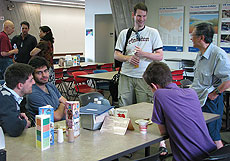Brewing a better brainstorm

Young scientists and researchers take a break to talk with their colleagues during the DZero collaboration meeting in June. A brainstorming session involving graduate students and post-docs took place as part of the meeting.
Take a batch of young DZero scientists, subtract professors and deadlines, stir in a little fun, and you could generate some bright ideas for optimizing the experiment. That was the vision of Brendan Casey, a DZero collaborator at Fermilab.
So last month, during the DZero collaboration's meeting at Fermilab, he gathered a group of graduate students and postdocs for a spirited brainstorming session.
"The most frequent feedback I've received is that the session was too short," Casey said. "That's encouraging. It means people believe this is a valuable way to think."
Casey was inspired by his experience in the Strategic Laboratory Leadership Program at the University of Chicago's Booth School of Business. During a customized executive education seminar on fostering creativity, participants shared ideas in carefully planned brainstorm activities. Casey, captivated by the energy and effectiveness of the exercises, decided to bring the experience home to colleagues still early in their careers.
Brainstorming is just one of the tactics participants learn in the SLLP program. Over eight intense days, spread over several months, 25 participants from Fermilab and Argonne National Laboratory study leadership, innovation and strategic planning. They complete a final project in mixed-laboratory teams and present their product to both laboratory directors. Participants can also opt into a separate, week-long course through Booth's executive education program.
So far, three classes of Fermilab and Argonne scientists have completed the SLLP curriculum, which was developed by representatives from both laboratories and the University of Chicago beginning in 2006.
"When we see that participants are implementing the lessons they've learned here, that's a success," said Michelle Terry, director of Operations and Education Programs for the Office of the Vice President for Research and National Laboratories at the University of Chicago. In addition to stirring ideas, she said, the program strengthens ties among the three institutions.
Casey echoed the praise. Everyone wants to think outside the box, he said, "but you have to actively pry open the box. That's what this program teaches you to do."
-- Rachel Carr
|